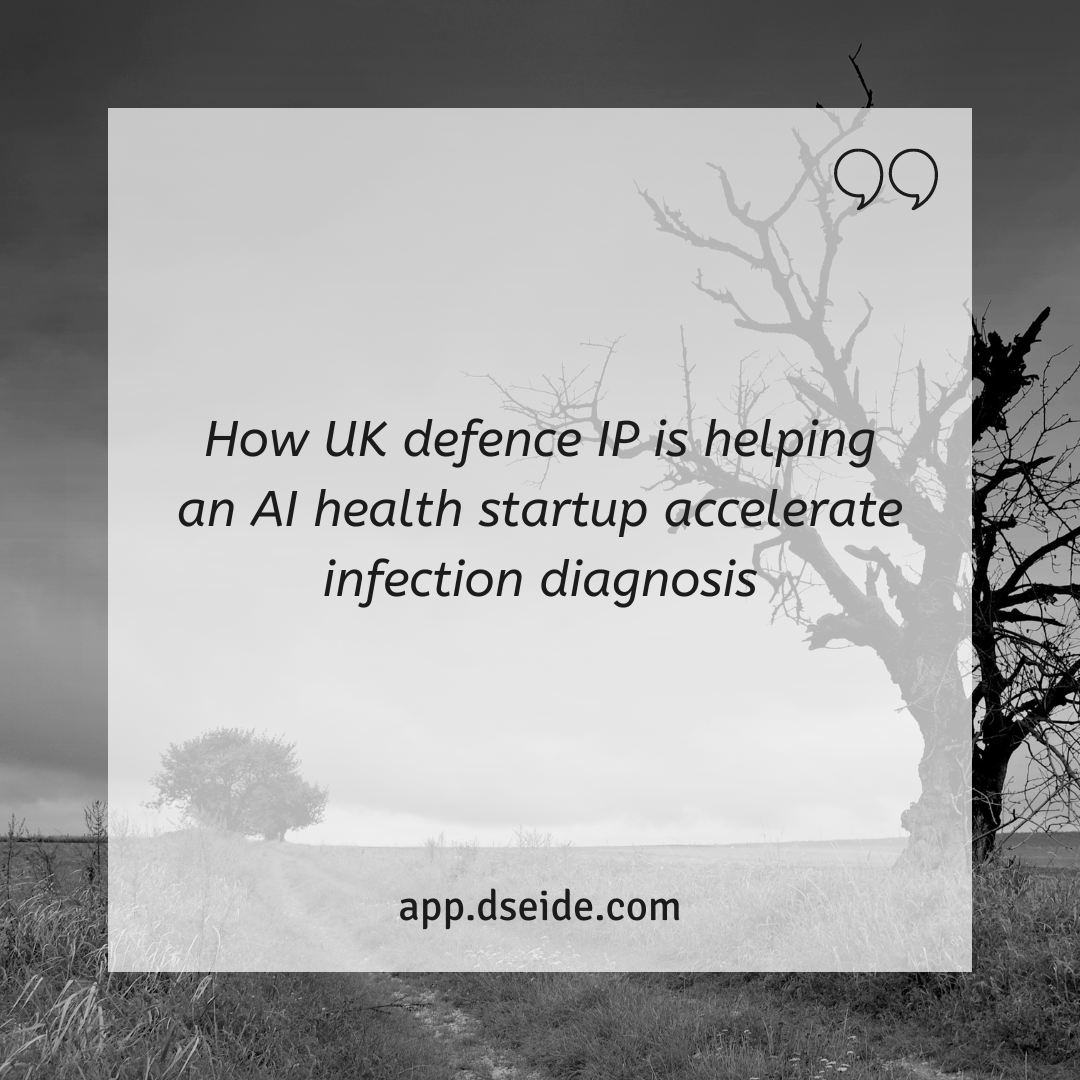While the UK’s Presymptom Health is by no means alone among healthcare startups globally in using artificial intelligence (AI) to offer products or services that would not otherwise be possible, it is undoubtedly unique among those doing so in how it came about.
Founded in 2019, the company was spun out of Ploughshare, a Ministry of Defence (MoD)-owned entity created in 2005 to commercialise intellectual property (IP) from UK defence and government research. Ploughshare identified work by the MoD’s Defence Science and Technology Laboratory (Dstl) research and development agency as being potentially transformative for infection diagnosis.
Initially focussed on sepsis, the technology could determine whether a patient would develop the condition up to three days before symptoms appeared. Trained on data from a 12-year study, it used AI and its subset machine learning (ML) to diagnose infection at an earlier stage and with higher accuracy than was previously possible.
“They were gathering many samples and lots of data from 4,500 patients, some of which would go on to develop illness,” explains Iain Miller, CEO of Presymptom Health, to Medical Device Network. “The insight was, if you recruit them before they’re sick, you create a resource to train an algorithm that sees the sickness coming rather than reacting to it and picking it up when it’s rather late and you might have less opportunities.”
The output of that study, which was started shortly after 2000, was a biobank containing in the region of 70,000 samples – a resource that would become all the more valuable as the emergence of AI during the 2010s allowed for a step change in data interrogation.
“We had this huge resource, and this is a classic case of where you can use machine learning,” says Miller. “You’ve got a lot of data, and, to use the parlance of AI and machine learning, they talk about having a lot of ‘features’. What you’ve got is a lot of features in your data, and you’ve got outcomes of interest, so you’re trying to train up a set of features that are diagnostic or predictive of the outcome of interest.
Source: Medical Device Network
#healthcarestartup #startup #healthcaredevice #dseide
Founded in 2019, the company was spun out of Ploughshare, a Ministry of Defence (MoD)-owned entity created in 2005 to commercialise intellectual property (IP) from UK defence and government research. Ploughshare identified work by the MoD’s Defence Science and Technology Laboratory (Dstl) research and development agency as being potentially transformative for infection diagnosis.
Initially focussed on sepsis, the technology could determine whether a patient would develop the condition up to three days before symptoms appeared. Trained on data from a 12-year study, it used AI and its subset machine learning (ML) to diagnose infection at an earlier stage and with higher accuracy than was previously possible.
“They were gathering many samples and lots of data from 4,500 patients, some of which would go on to develop illness,” explains Iain Miller, CEO of Presymptom Health, to Medical Device Network. “The insight was, if you recruit them before they’re sick, you create a resource to train an algorithm that sees the sickness coming rather than reacting to it and picking it up when it’s rather late and you might have less opportunities.”
The output of that study, which was started shortly after 2000, was a biobank containing in the region of 70,000 samples – a resource that would become all the more valuable as the emergence of AI during the 2010s allowed for a step change in data interrogation.
“We had this huge resource, and this is a classic case of where you can use machine learning,” says Miller. “You’ve got a lot of data, and, to use the parlance of AI and machine learning, they talk about having a lot of ‘features’. What you’ve got is a lot of features in your data, and you’ve got outcomes of interest, so you’re trying to train up a set of features that are diagnostic or predictive of the outcome of interest.
Source: Medical Device Network
#healthcarestartup #startup #healthcaredevice #dseide
While the UK’s Presymptom Health is by no means alone among healthcare startups globally in using artificial intelligence (AI) to offer products or services that would not otherwise be possible, it is undoubtedly unique among those doing so in how it came about.
Founded in 2019, the company was spun out of Ploughshare, a Ministry of Defence (MoD)-owned entity created in 2005 to commercialise intellectual property (IP) from UK defence and government research. Ploughshare identified work by the MoD’s Defence Science and Technology Laboratory (Dstl) research and development agency as being potentially transformative for infection diagnosis.
Initially focussed on sepsis, the technology could determine whether a patient would develop the condition up to three days before symptoms appeared. Trained on data from a 12-year study, it used AI and its subset machine learning (ML) to diagnose infection at an earlier stage and with higher accuracy than was previously possible.
“They were gathering many samples and lots of data from 4,500 patients, some of which would go on to develop illness,” explains Iain Miller, CEO of Presymptom Health, to Medical Device Network. “The insight was, if you recruit them before they’re sick, you create a resource to train an algorithm that sees the sickness coming rather than reacting to it and picking it up when it’s rather late and you might have less opportunities.”
The output of that study, which was started shortly after 2000, was a biobank containing in the region of 70,000 samples – a resource that would become all the more valuable as the emergence of AI during the 2010s allowed for a step change in data interrogation.
“We had this huge resource, and this is a classic case of where you can use machine learning,” says Miller. “You’ve got a lot of data, and, to use the parlance of AI and machine learning, they talk about having a lot of ‘features’. What you’ve got is a lot of features in your data, and you’ve got outcomes of interest, so you’re trying to train up a set of features that are diagnostic or predictive of the outcome of interest.
Source: Medical Device Network
#healthcarestartup #startup #healthcaredevice #dseide






